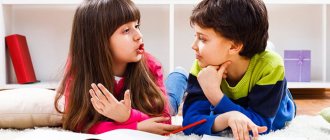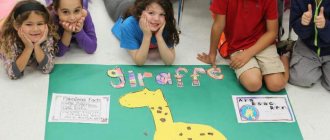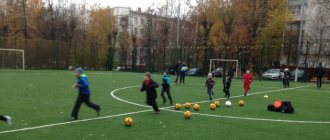Organization of sports games with children of senior preschool age
Bibliographic description:
Ablitarova, A. R. Organization of sports games with children of senior preschool age / A. R. Ablitarova, F. A. Seytibramova. — Text: direct // Innovative pedagogical technologies: materials of the IV International. scientific conf. (Kazan, May 2016). - Kazan: Buk, 2016. - pp. 175-177. — URL: https://moluch.ru/conf/ped/archive/190/10026/ (access date: 01/25/2022).
In the article, the author reveals the features of the influence of sports games on the development of physical qualities of children of senior preschool age.
It is in preschool age that the foundations of health and physical development are laid, motor skills are formed, and the foundation for the development of physical qualities is created. Sports games and exercises help improve the functioning of the basic physiological systems of the body, improve physical development, physical fitness of children, and cultivate positive moral and volitional qualities.
Sports games, as a type of activity, are characterized by such features as changing conditions of certain actions; Therefore, most of these games are associated with the manifestation of motor abilities: speed-strength, coordination, endurance, strength, flexibility. In sports games, the “sense of muscle effort”, “sense of space”, “sense of time” is improved, and the functions of various analyzers are improved.
When teaching sports games in kindergarten, it is necessary to develop children’s interest in physical education, as well as the need for independent activities.
Formulation of the problem . The idea of humanizing preschool education is central to the process of its renewal. Scientists and practitioners are increasingly inclined to the conclusion that the system of physical education for preschool children should have a holistic, humanistic impact on the individual, ensuring the realization of every child’s right to constant and the most complete physical development. Organizing sports games requires taking into account the age characteristics of children, their physical development and physical fitness, taking into account the tasks of physical education of preschool children. Thus, the topic of the article “Organization of sports games with children of senior preschool age” is relevant for the methods of physical education of preschool children.
Purpose of the article : to reveal the features of the influence of sports games of varying degrees of mobility on the development of older preschool children.
Sports games for children are outdoor games for children with elements of sports, such as basketball, table tennis, football, hockey, skating and skiing.
Sports games require a good level of development of basic movements and physical qualities.
Basic movements are vital movements for a person, which he uses in his diverse activities: walking, running, jumping, throwing, climbing.
Physical qualities are innate morphofunctional qualities, thanks to which physical (materially expressed) human activity is possible, which receives its full manifestation in purposeful motor activity. The main physical qualities include: muscle strength, speed, endurance, flexibility and agility.
To successfully engage in sports games, children of older preschool age should improve the basic types of movements and physical qualities that are primarily necessary for this sports game.
The age of 5–7 years is often called the “period of first extension,” when a child can grow by 7–10 cm in a year. Each age stage is characterized by different rates of growth of individual parts of the body. During the sixth year, the length of the limbs, the width of the pelvis and shoulders rapidly increase in children of both sexes. However, there are individual differences in these indicators, as well as differences between boys and girls. An increase in physiometric indicators against the background of an insufficiently expressed correlation with anthropometric characteristics indicates that at this period of life they largely depend on learning, as well as on the individual motor experience of the child.
The development of movements in children of senior preschool age is closely connected with the entire educational process of kindergarten, which determines the overall development of the child, his mental qualities, behavior, and direction of interests. Physical education of older children requires special attention. The age characteristics of children in this group are favorable for achieving good physical development and improving health. Older preschoolers have the opportunity to master new complex forms of movements, as well as improve some elements of their technique. Children achieve relatively high results in performing movements, are able to perform them at different rates and amplitudes, showing significant speed-strength capabilities and endurance. To optimally solve the problems of physical education of preschool children, the use of sports exercises and outdoor games during walks is currently of particular importance. Sports games, as a type of activity, are characterized by such features as changing conditions of certain actions; Therefore, most of these games are associated with the manifestation of motor abilities: speed-strength, coordination, endurance, strength, flexibility. In sports games, the “sense of muscle effort”, “sense of space”, “sense of time” is improved, and the functions of various analyzers are improved.
When teaching sports games in kindergarten, it is necessary to develop children’s interest in physical education, as well as the need for independent activities. The introduction of elements of competition helps to increase children's interest in the game and its results. The introduction of elements of competition develops children's attention, endurance, and self-control.
Drawing a conclusion, it can be argued that the development of movements in children of senior preschool age is closely connected with the entire educational process of the kindergarten, which determines the overall development of the child, his mental qualities, behavior, and direction of interests. Physical education of older children requires special attention. The age characteristics of children in this group are favorable for achieving good physical development and improving health. Older preschoolers have the opportunity to master new complex forms of movements, as well as improve some elements of their technique. Children achieve relatively high results in performing movements, are able to perform them at different rates and amplitudes, showing significant speed-strength capabilities and endurance.
Children of senior preschool age master various movements and practice them consciously. They acquire a wide range of special knowledge, the ability to analyze their actions, highlight their essential links, change and rebuild them depending on the result obtained, assessment and situation. All this contributes to the activation of children’s motor activity in the learning process, the manifestation of volitional efforts, initiative, and the development of children’s interest in physical education classes. Mastery of all types of sports games and exercises is important for the versatile physical fitness of children. However, when teaching a child this or that sports exercise, one should take into account the age characteristics of the student and strictly dose the load. Only systematic joint care of the teacher and parents for the child’s motor development can bring the desired results: systematic repetition of the same exercises and logical continuity of classes are the main prerequisites for success.
Literature:
- Adashkyavichene E. J. Sports games and exercises in kindergarten: Book. for a kindergarten teacher garden - M.:, 1992.
- Bolotina L. R., Komarova T. S., Baranov S. P. Preschool pedagogy. Tutorial. - M., 2006.
- Gerbova V.V., Ivankova R.A., Kazakova et al. Raising children in the senior group of kindergarten: A manual for kindergarten teachers. - M., 1984.
- Dmitrienko T.I. Sports exercises and games for preschool children. - Kyiv, 1983. - 122 p.
- Preschool pedagogy. Textbook manual for pedagogical students. in-s. / V. I. Loginova, P. G. Samorukova, B. S. Leikin, etc. - M., 1995.
- Krasnitskaya G.S., Borshanskaya B.R. et al. Workshop on preschool pedagogy. - M., 2008.
- Penzulaeva L.I. Physical education classes with children 5–6 years old: A manual for children's educators. garden - M., 2002.
- Psychology of a preschooler. Reader / Comp. G. A. Uruntaeva. - M., 1997.
- Psychocorrection and developmental work with children of different ages / Ed. I. V. Dubrovina. - M., 2003.
- Sapin M.R., Bryktina Z.G. et al. Anatomy, physiology and hygiene of a child (preschooler and junior schoolchildren). - M. - 2005.
- Uruntaeva G. A. Preschool psychology. Tutorial. - M., 2000.
- Usakov V.I. Features of the methodology for the initial learning of sports games by preschoolers. - Krasnoyarsk, 1996. - 98 p.
- Fetisov V. A. With thoughts about the health of the nation / V. A. Fetisov. - M.: Rossport, 2005 - p. 2.
- Frolov V.G. Physical education, games and exercises while walking. - M.: Education, 1986. - 172 p.
- Kholodov Zh. K. Theory and methodology of physical education and sports: Textbook. aid for students higher textbook institutions / Zh.K. Kholodov, BC Kuznetsov. — 3rd ed., erased. - M.: Publishing House, 2004. - 33; 39–40 s.
- Shebeko V. N., Ermak N. N. Physical education of preschool children. M.: ACADEMIA, 2007. - 176 p.
- Shebeko V.N., Ermak N.N., Shishkina V.A. Physical education of preschool children, 3rd edition, 2008. - 190 p.
- Shebeko V.N. et al. Methods of physical education in preschool institutions: a textbook for student teachers. colleges and schools. - M.: Universitetskoe, 2005. - 184 p.
- Aliev M. N., Guseinov A. G. Education of moral and volitional qualities in children through physical education: Pedagogy, No. 1, 2008.
Key terms
(automatically generated)
: game, senior preschool age, child, kindergarten, physical education of children, age characteristics of children, preschool age, quality, physical education, physical development.
"Let's help Dunno"
Age 5-7 years Material - 5 cards with a playing field and 25 cut cards with images of sports equipment. Goal To develop attention, the ability to recognize and name sports equipment and sports. Number of players from 1 to 5. Motivation - to help Dunno find sports equipment. Progress of the game All players receive a conditional number of cards (they choose from the general pile). A presenter is identified, who takes cut cards from an opaque bag and voices what is indicated in the picture. The player whose pictures match takes it for himself and puts it on the card. The one whose cards are completely closed wins. Looks like that:
Here you can download the didactic game sports lotto Let's Help Dunno for color printing in PDF format
Didactic game on physical education for preschoolers
"The fifth wheel"
Age 5-7 years The goal is to know and name sports equipment, to develop the ability to classify objects according to essential characteristics. Didactic material: a set of 10 cards, on each card there are 3 stripes depicting 5 items, 4 items are sports equipment, and 5 are extra. Each extra item in the strip belongs to a certain category (toys, fruits, vegetables, food, household appliances, furniture, kitchen utensils, interior items, hats) Progress of the game: Children name sports equipment, identify the extra picture, explaining their choice, name a generalization the concept of “extra” images. For example: 1 card: - basketball, volleyball, soccer ball, rubber ball - sports equipment, pyramid - toy, which means it is extra; - a puck, a baseball, a shuttlecock, a tennis ball - sports equipment, a drum - a toy, which means it is superfluous; - a baseball bat, a hockey stick, a tennis racket, a gymnastic stick - sports equipment, a truck - a toy, which means it is superfluous; Extra pictures are toys (general concept) It looks like this:
Download the didactic game The fifth odd one for color printing in PDF format
Didactic game cut pictures




